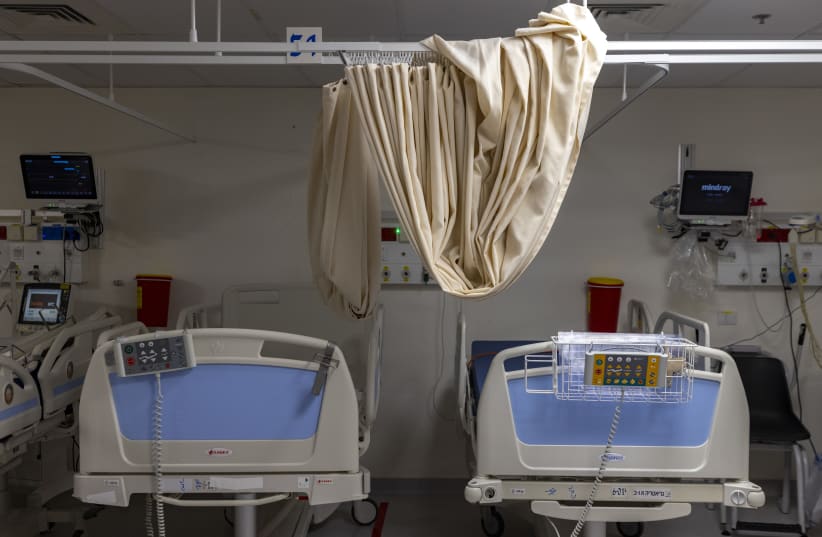Concern in Israel is mounting that the country might soon experience a fifth wave of the coronavirus pandemic, coronavirus commissioner Prof. Salman Zarka warned during a cabinet meeting on Tuesday night.
As of Wednesday, Israel had 6,500 active cases. They had dropped as low as 5,000 in previous days.
Exactly 603 cases were identified on Tuesday. A week earlier there were 558, and two weeks before that there were 517.
However, according to Prof. Cyrille Cohen, head of the immunology lab at Bar-Ilan University and a member of the Health Ministry’s advisory committee for clinical trials on vaccines, talk about a fifth wave is not the correct way to frame the situation.
“We are in a very different situation compared with June, when we had almost no coronavirus cases in Israel,” he said. “We never managed to get to that point after the fourth wave.”
Israel had 200 active cases a day in June, with only a few new virus carriers identified each day.
Health officials and experts have been debating what has caused the rise in cases.
Forty-three percent of the new cases registered in the past week were recorded among children age five to 11. That cohort just became eligible for a vaccine.
Another 7% has been recorded among children up to age four who cannot be inoculated, and an additional 8% among 12-15-year-olds, who have a low rate of vaccination compared with other segments of the population.
Overall, unvaccinated individuals make up over 75% of new patients, with another 11% recorded among people whose vaccine is considered expired.
These numbers confirm that the infections are spreading especially among those not considered protected according to the Health Ministry’s criteria. That population also makes up the vast majority of patients in serious condition: out of 124 such patients as of Wednesday, 101 were not vaccinated, and another seven were vaccinated over six months ago.
According to Cohen, if there was still an illusion a few months ago that Israel could beat corona completely, it is time to acknowledge that this is not so.
“I think the time has come to be aware that we just have to continue to find a balance between our daily life with minimal restrictions and a virus that is still around us,” said Cohen.
The professor suggested that some measures should be taken to ensure that morbidity remains relatively low.
“First of all, I think it would be important to enforce the rules that are already there,” he said. “In the past few days I went to the restaurant twice and nobody checked my Green Pass. In addition, in one of the venues the waiters were not wearing masks.”
Cohen said he is also in favor of maintaining some form of a cap on gatherings, especially indoors.
Some experts are suggesting that the virus is spreading because immunity is waning among individuals who received a booster.
According to Cohen, the question of waning immunity should be looked at differently.
“Mine is just a hypothesis, but I think we need to look at the protection granted by vaccination as divided in two phases,” he said. “For a first period after the shot, we are highly protected both against infection and against serious symptoms. After some time, though, it might take a while for our immune system to activate its cellular memory against the virus, and therefore, one might get infected but still be protected against severe disease.”
Cohen said this might also be the case for the booster, noting that he believes that “this scenario is consistent with the data we are seeing.”
This does not mean vaccines are not a crucial way to protect the population, Cohen said, but rather, that Israel should adjust its expectations when it comes to the virus and accept that it will continue to circulate.
During the cabinet meeting, Prof. Eran Segal, a computational biologist for the Weizmann Institute, Rehovot, said that since the beginning of November, numbers have been pointing to a fall in the immunity of the population, similar to what happened in May.
According to Segal, the decline is caused by more time having passed for those who were only vaccinated with the first two shots, and a similar scenario is occurring for those who recovered but did not get vaccinated.
“This decline is going to continue unless we intervene and continue to vaccinate,” said Segal.
While the scientist acknowledged it is too early to say whether there is also a decline in vaccine efficacy among those who received a booster, he admitted that it is still a possibility.
On Wednesday, the Health Ministry issued a statement denying such a scenario.
“As clarified last night during the corona cabinet by members of the expert team, there is no evidence at this stage of a decline in the efficacy of the third dose of the corona vaccine,” the ministry said. “On the contrary, preliminary evidence from the laboratory shows that stronger and better antibodies are formed after the booster.
“The team of experts warned of a decrease in the general immunity in the State of Israel as the number of those entitled to a third vaccine who have not yet received it has increased.”
While the first data about the vaccines – especially the one manufactured by Pfizer that is currently the most used in Israel – suggested a very high efficacy in preventing both infections and serious symptoms, a higher efficacy in preventing serious symptoms is common in many vaccines.
The authorities hope that reaching out to both the five-11 cohort and those who have not received the booster will help the country avoid a fifth wave. They also hope it will avoid the worst-case scenario illustrated by Hebrew University experts during the cabinet meeting, of 2,500 new cases a day by the end of December.
Prime Minister Naftali Bennett instructed that all students undergo an antigen test before returning to school after the Hanukkah break, as they did before the beginning of the school year and after the High Holy Days.
He also said if there is a concern that specific events during Hanukkah can cause new outbreaks, they will be shut down.
In light of the situation, the cabinet decided that no further restrictions will be lifted at the moment, and the validity of regulations such as indoor occupancy limits and the Green Pass outline will be extended for another two weeks, until December 22. The decision was approved by the Knesset Law and Constitution Committee on Wednesday.
Out of a population of 9.3 million, 6.27 million Israelis have received at least one dose of the vaccine, 5.76 million at least two, and 4.05 million have had the booster shot.
About 1.1 million Israelis still need to receive a booster, in addition to another 700,000 individuals over age 12 who have not been inoculated at all.
As children age five-11 start to get vaccinated, more than one million additional Israelis have become eligible for the shot. On the first day of the campaign, 8,000 of them received a jab.
The R rate, representing the average number of people one virus carrier infects, stood at 1.08.

